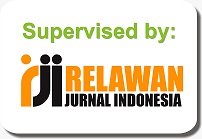Pengembangan Karakter Peserta Didik Melalui Scientific Approach dalam Pembelajaran Pendidikan Agama Islam Berbasis Kurikulum 2013 (Sebuah Grounded Theory)
DOI:
https://doi.org/10.32939/tarbawi.v15i02.357Abstract
Islamic Education in schools is currently considered to be less effective and efficient. In addition, learning orientation is cognitive oriented and has not been able to optimize affective aspects, especially psychomotor. Though the spirit and essence of learning Islamic Education both in schools and madrasas give birth to graduates who have good, skilled Islamic insights and knowledge and noble character. Therefore, to realize the learning process of effective and efficient Islamic Education, a breakthrough is needed using the scientific approach, which is based on the 2013 curriculum. In its application, the scientific approach is an inductive, empirical approach. requires the flow of rational thinking, critical and emphasizes empirical (sensory) truth, needs to be synergized / integrated with theological, intuitive (zawq) approaches and deductive and supranational revelations to achieve the learning objectives of Islamic Education, namely increasing faith and devotion and building noble character . This paper aims to describe the application of the scientific approach in the learning of 2013 curriculum-based Islamic Education to create graduates with character.
Downloads
References
Bungin, Burhan. (2001). Metodologi Penelitian Kualitatif: Aktualisasi Metodologis ke Arah Ragam Varian Kontemporer. Jakarta: Raja Grafindo Persada.
Creswell, John W. (2012). Educaional Reseach, Planning, Conducting and Evaluating Quantitative and Qualitative Research. Boston: Pearson.
Darajat, Zakiyah. (1992). Ilmu Pendidikan Islam. Jakarta: Bumi Aksara.
Hamalik, Omar. (2003). Kurikulum dan Pembelajaran. Jakarta: Bumi Aksara.
Hayati, Isnaria., & Sujadi, Eko. (2018). Perbedaan Keterampilan Belajar Antara Siswa IPA Dan IPS. Tarbawi : Jurnal Ilmu Pendidikan, 14(1), 1-10. doi:10.32939/tarbawi.v14i1.250.
Jamin, Ahmad,. (2014). Filsafat Pendidikan Islam. Bandung: Alfabeta.
Krippendorff, Klaus. (1991). Analisis Isi: Teori dan metodologi, (terj. Farid Wajdi). Jakarta: Rajawali Press.
Majid, Abdul & Andayani, Dina. (2005). Pendidikan Agama Islam Berbasis Kompetensi. Bandung:Remaja Rosdakarya.
Moleong, Lexy. (2014). Metode Penelitian Kualitatif. Bandung: Rosdakarya.
Muhadjir, Noeng. (1996). Metode Penelitian Kualitatif. Yogyakarta: Rake Sarasin.
Muhaimin. (2002). Peradigma Pendidikan Islam: Upaya Mengefektifkan PAI di Sekolah. Bandung: Remaja Rosdakarya.
Nazir, Moh. (1999). Metode Penelitian. Jakarta : Ghalia Indonesia.
Ramayulis. (2005). Ilmu Pendidikan Islam. Jakarta: Kalam Mulia.
Sagala, Syaiful. (2005). Konsep dan makna Pembelajaran. Bandung: Alfabeta.
Shihab, M. Quraish. (1996). Membumikan al-Qur’an. Bandung: Mizan.
Sujadi, Eko. (2017). Penerapan Pendidikan Karakter Cerdas Format Kelompok Untuk Meningkatkan Nilai Kejujuran Mahasiswa Bimbingan Konseling Islam (BKI) Institut Agama Islam Negeri (IAIN) Kerinci. Tarbawi : Jurnal Ilmu Pendidikan, 13 (1): 97-108.
Sujadi, Eko., Meditamar, Muhd. Odha., Ahmad, Bukhari., Rahayu, Anita. (2018). Pengaruh Konsep Diri dan Locus of Control Terhadap Motivasi Berprestasi. Educational Guidance and Counseling Development Jounal, 1 (1): 32-51. dx.doi.org/10.24014/egcdj.v1i1.4808
Sujadi, Eko Sujadi., Ayumi, Rinda Tri., Indra, Syaiful., Sumarto., MRA, Raja Rahima. (2018).Layanan Konseling Kelompok dengan Menggunakan Pendekatan Cognitive Behavioral untuk Membentuk Internal Locus of Control. Jurnal Fokus Konseling, 2 (2): 176-184. https://doi.org/10.26638/jfk.626.2099









